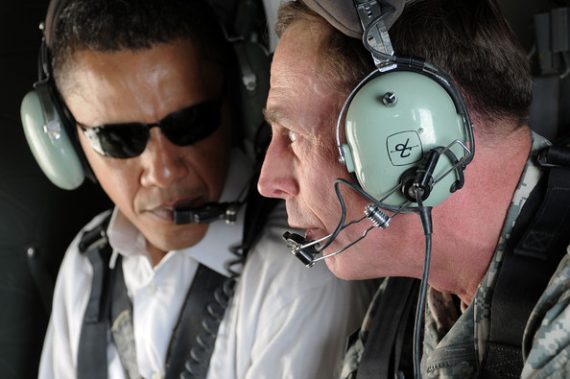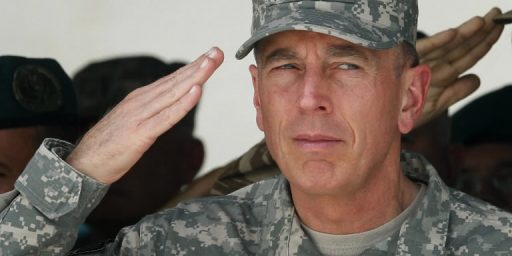Presidents, Generals, and War Decisions
Should President Obama do whatever General Petraeus wants in Afghanistan?
Think Progress‘ Ali Gharib quotes Senator Saxby Chambliss (R, GA) and Fox host Bill O’Reilly issuing variants of “Whatever General Petraeus says we ought to do in Afghanistan, President Obama should do.”
Gharib observes, “For all their crowing about the Constitution, many conservatives would do well to check outArticle II, which explicitly states: ‘The President shall be Commander in Chief of the Army and Navy of the United States.'” And adds, “Luckily for the republic, the object of Chambliss and O’Reilly’s adoration understands the U.S. Constitution and the role generals are supposed to play in relation to the country’s civilian leadership: Petraeus explained the chain of command during the hearing.”
Well, yes. But I don’t see either Chambliss or O’Reilly saying that the wishes of the generals in the field legally trump those of the president. Rather, they’re declaring that they trust David Petraeus’ judgment on military affairs over Barack Obama’s. Presumably, that’s partly because Petraeus is the most revered American military figure since World War II. And the fact that Petraeus’ recommendations happen to coincide with their preexisting policy preference doesn’t hurt, either.
Much attention has been given to Petraeus’ declaration that “ultimately the decision has been made. And with a decision made, obviously I support that.” But that’s simply a truism; once the president has made a decision, the commanding general has three options: 1) salute smartly and enthusiastically carry out his orders; 2) resign in protest; and 3) treason.
More importantly, though, Dr. Petraeus actually learned something at his Princeton PhD program. He correctly noted, “The risk being assessed in this case, from my perspective, the risk having to do with the ability to achieve objectives of the military campaign plan, acknowledging that at every level of the chain of command above me there are additional considerations, and each person above me, all the way up to and including the President has a broader purview and broader considerations that are brought to bear.” Joint Chiefs Chairman Mike Mullen echoed this, noting, “Only the president, in the end, can really determine the acceptable level of risk we must take.”
Petraeus is doubtless more qualified to assess the tactical situation on the ground and assess his logistical and manpower needs and to make the right calls in how to deploy the assets at his disposal than the president. Any president who interferes in such decision-making is a fool. But wars are fought to achieve political objectives and it is up to the president to decide, with some not insignificant inputs from Congress, whether the probability of achieving those objectives is high enough to be worth the costs in blood and treasure.







This touches very close to the problem that I have with President Obama’s current tack. He seems to be adjusting the resources available to achieve strategic objectives without adjusting the objectives. Has he silently abandoned the previous strategic objectives? Does he believe that reducing the resources available will make it easier to achieve the strategic objectives?
Does he believe that the objectives have already been accomplished? Accomplished as well as they’re likely to be? Does he believe that the strategic objectives will have been accomplished by December 2012?
I think that the electorate really needs to be informed on these matters. It’s reasonable to withhold tactical information from the people. Not so the strategic objectives.
Why is Petaeus so revered, and by who? Is he not the commander of multiple quagmires?
Is Petraeus more revered than Schwarzkopf after Desert Storm? Or Colin Powell?
I’d hazard a guess that there are large segments of the public that have no idea who General Petraeus is.
I think the admiration comes from need — we seem to need heroes — and because of the general’s educational accomplishments, and because he is considered an authority on counterinsurgency.
He reads as the perfect sort of general for a fairly bloodless, restrained period in our military history.
As I mentioned in another thread a few days back I’ve never liked the notion of military force as a sort of scalpel. I’ve always believed our real strength was in wielding a sledgehammer and that attempts to make war overly precise, nuanced, subtle, were doomed. We’re over-intellectualizing war, and I think we’re doing it because the American public simply doesn’t have the stomach for the real hardcore slaughter anymore.
It’s probably a good thing that we don’t have the heart for Hiroshimas or Gettysburgs, but savagery is an inherent element of war and pretending otherwise has just given us a string of Vietnams, Iraqs and Afghanistans.
Say we give Petraeus everything he wants…what’s he going to accomplish…and when. He got a 30% escalation a year ago. What’s different? He got a huge escalation in Iraq but it was really bribing the Sunnis not to blow us up that changed the game there.
The military is paid to want to fight. Thats why we have civilians to keep them in check; like the owner of a Rotie keeping him on a chain so he doesn’t maul the neighbor.
Enough already.
It pains me to see someone taking anything the Republicans say at face value.
They are no more interested in following the Constitution than they are interested in having a black president.
We liquified well over a million Vietnamese during the course of that war. The Soviets shot anything that moved during their attempt to pacify Afghanistan. Fom an historical perspective it is usually not possible to beat an enemy into submission unless they are inclined to it. Military power has very real limits, a fact americans have been remarkably averse to learning. The Taliban won’t surrender under any circumstances; in fact the more power we bring to bear, the stiffer the resistance we meet. Lest we forget Stanley McChrystal’s one moment of honesty regarding Afghanistan:
We’ve shot an amazing number of people who, to my knowlege, turned out not to have been a threat.
We’ve been increasingly brutal in our tactics since Petraeus assumed command, and support for the Taliban has swelled. Unless we’re willing to use nuclear weapons to cleanse the country of all life, we arn’t going to get anything that even resembles victory.
Ben:
We killed a lot of people in Vietnam. But it was still a limited war. No cities were burned down. No invasion took place. And we’ve no doubt killed a lot of people in Afghanistan, but still a fraction of what we are capable of.
When we fight these limited, incremental wars, we offer the enemy an opportunity to adjust and counter. The Russians didn’t give the Germans that chance as they marched to Berlin, nor did we give the Japanese a chance to reboot on Okinawa. One of the great insights that saved the Union was when Grant realized he didn’t need to withdraw and rest after a battle but could get up the next day and attack again.
It’s no different from a street fight. You don’t punch a guy and stand back to measure the effect, and see what he’ll do, you hit him until he stops moving, or is rendered incapable of moving.
Again, I’m not arguing the morality, just the effectiveness. Although even on a moral level, knowing what we know now, wouldn’t it have been better to knock over the Taliban and then drop nukes in a few of the major Pashtun mountain passes as an enduring message? Wouldn’t a month of savagery actually have saved lives, not to mention treasure? Or to put it another way, would we be better of today if we’d gone easier on Japan and were still fighting them today?
Knowing what we know now, it would have been better if we didn’t attack the Taliban at all.
The armchair generals never seem to understand our opponents are attacking us at anywhere near their full capacity either…
Oops, I meant aren’t attacking us…
Michael R — By your logic, we should also drop nukes on Iran. And Iraq. Oh, and Mexico, too, just in case. Wouldn’t that send an enduring message?
I understand the logic of empire. I understand that the way to subjugate a people is to crush them thoroughly under the bootheel. But I hate to see that advocated by someone whose opinions I generally respect.
Yes, if we want to act like Nazis, we’ll get to exert our will much more than we do now. But if we have to be Nazis in order to get what we want, maybe what we want isn’t worth getting.
The Romans frequently forgave their conquests many things, including revolts…
The trick to running a successful empire is supply your subject peoples things they couldn’t achieve on their own.
What has Americans done for the people of Afghanistan besides randomly killing them and putting the most corrupt leaders we could find in charge of their country.
The Romans would have executed Hamid Karzai and his cronies years ago.
WR:
I clearly said I was not advocating. I’m just analyzing.
We’re not at war with Iran, and certainly not with Mexico. If we were I would try first to figure out how to win, and then I would decide if it was morally acceptable. (It’s a quirk of mine to first figure out the winning move, the shortest line between two points, and then look at the right or wrong. I like to know what’s possible first.)
We were at war with the Taliban government of Afghanistan, and with damned good reason. But with benefit of hindsight we probably should have laid on the mother of all reprisals and walked away. We’d have made our point, we’d have knocked off the guilty government, and we’d have saved lives and money in the process.
We’re trying nuance and humaneness in situations where it ends up costing more lives and ends in futility. It’s not truly humane if something that could have been wrapped up in 30 days drags out to ten years and ends up causing more suffering.
Against that, we have a new thing we can do thanks to technology: permanent denial of stability at zero cost in American lives. Interesting.
@Michael
What I’m suggesting is that no amount of force would be sufficient to subdue Afghans or Vietnamese, i.e. we can kill them but not conquer them. Both have a very long history of invasion/repelling the invasion, even if it took centuries. We tend to look at things from a quantitative perspective: troop ratios, force multipliers, funding levels and training programs.
In Afghanistan we are dealing with a force vastly inferior in quantitative terms, but possessed of a qualitative advantage we have failed to come to grips with: their tribal and religious identity, honor codes, vendetta, familial connections. They resist, and we fall back on the same tactical and strategic thinking which emerged from World War II. We look for technological fixes, ways to bring massive firepower to bear against distinct enemy units. We attempt to use drones to desynchronize their operations, to disrupt command and control.
We fight as though we’re at war with the Soviet Union.
This war is being led by generals when we should be listening to a good cultural anthropologist and pursuing a political settlement.
What reason is that, Michael?
The Taliban never did anything to us.
The people of Florida and Arizona harbored and trained the 9/11 hijackers.
Ben:
I think too much is made of the character of the Vietnamese or the Afghans. I think it’s terrain. Jungles and mountains have always been tough ground to take. It implies that the Poles or the Chinese are pansies for being rolled over so many times. We broke the Japanese who were not exactly weaklings, and the Russians (with an assist from us and others) broke the Germans who were likewise not wimps. We broke the Seminoles and the Apaches.
I think WW1 put an end to the notion that battles or wars are won by determination or esprit. Bullets beat esprit every time — unless you have a mountain or a jungle to hide in, or an open border with a sanctuary nation.
Ponce stated that “conservatives are no more intersted in following the Constitution than they are intersted in having a black preisdent”.
That begs the quesiton, are liberals and socialists more interested in a having a “black” president than they are in having a competent one? Foolishness is rampant in the consequence of voting, or not voting, based on race or gender. I did not vote for Obama because I do not believe in the ideas he represents, not the color of his skin, only the content of his character. Or maybe I SHOULD have voted for him because he is 1/2 white – liberals hate to be reminded of that, calls into question the desperate need to cure the white angst.
A very, very broad and racist assumption was made. Sorry, Ponce, many conservatives have brains and their agenda is not guided by the emotional, but founded in principle.